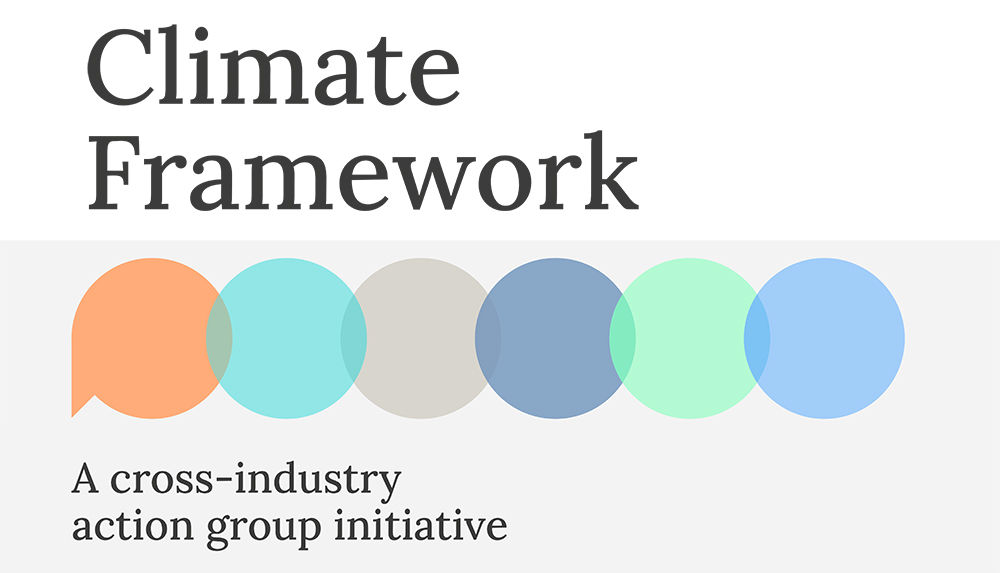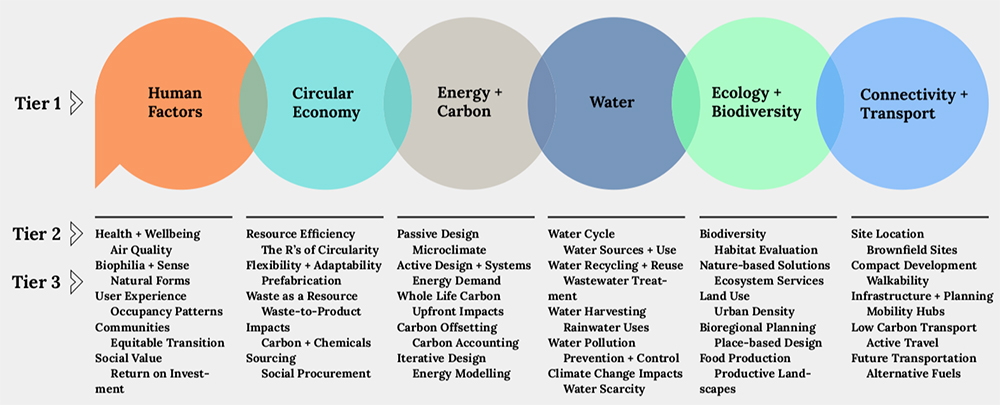Climate Framework: A cross industry action group initiative
Contents |
[edit] Background
In December 2020, based on an initial three month consultation, the Cross-Industry Action Group, a group of volunteers representing various professional institutes, and member organisations, launched its Climate Framework. This the first output of the group represented a collaborative vision to unite the industry and academia, in the effort to upskill and build a collective capacity for climate action.
It was envisaged that the Climate framework could be taken as the base set of topics by any organisation, professional institute, or academic institution to use, and build and apply in line with their discipline, area of focus, and contextual priorities. The initial event was followed by the launch of the Climate Curriculum in January 2021, alongside various supporting events and covering primarily what it described as tier 1 and 2 level topics.
A further 9-month international consultation, across the built environment sector and related academia, looking more closely at tier 3 level topics ended in May of the same year. The culmination of this combined work, the updated Climate Framework structure, was announced at the end of 2021.
The consultation lasted in the end, for 2 years with input from 750+ respondents, who helped shape the Climate Framework's structure (of Tier 1, 2 and 3 levels). The respondents were from various disciplines and all around the world and the Initiative was was presented at COP26 in Glasgow, UK as part of the Commonwealth-hosted skills and capacity building event, recognised at TIME Magazine's “Climate is Everything” April 2021 issue, and Design Council's ‘Design for Planet' publication.
[edit] Expanded resources
By the end of 2021, the final output was extended to include expert-level topics, presented a wider library of resources, and celebrated new organisations becoming the Initiative's official Supporters;
- Expert-level topics introduced: Developed with input from 750+ individuals all around the world, the expert-level topics aim to develop a well-rounded knowledge base, and build specialism, together with the ability to creatively analyse, evaluate, and use the gained knowledge in practice/academia.
- Climate Library grown: Including 200 more new resources, the revolutionary Climate Library provides currently provides 500+ resources, offering a single, central 'knowledge pool', drawing on the existing and emerging, invaluable content (provided across the industry and academia), for all the actors along the built environment value chain.
- Supporters celebrated: Widening its reach, the Climate Framework Initiative garners support from The Prince's Foundation, and the Union of International Architects, embodying a wide group of design community, and built environment professionals all around the world.
The work aimed to represent a new, transdisciplinary, and holistic framework, supporting the knowledge base every current and future built environment professional needs to be equipped with in order to halt climate change and mitigate its adverse impacts.
In 2022 further industry engagement and activity included a collaboration with BSRIA / LSBU to develop short courses leading to the report [1]“Climate education: the state of the industry + a new way forward” (Link here). Offering insights on utilising the Climate Framework as a common curriculum structure and guidance framework. In line with the commitments established in the CIC’s “Carbon Zero: the Professional Institutions’ Climate Action Plan”, the report also provided an overview of some of the best practice actions already taken by some of the industry organisations to advance built environment professionals’ competence around climate change.
The most recent development relating to the Climate Framework is the RIBA Climate Guide, which is a book structured around the Climate Framework, written by Mina Hasman and available for purchase. For further information visit here.
[edit] Climate Framework a continuously evolving taxonomy.
"Climate knowledge and consequently the related education continues to evolve with advancements in scientific evidence, industry insights and built environment data. Aimed to ensure its specialist topics respond to these advancements, although its overarching Tier 1 + 2 level topics will always remain the same for the construction industry, the Climate Framework taxonomy enables specialist (Tier 3 level) topics to be customised in order to respond to and reflect the required changes.
These changes may be as a result of new evidence presented by the climate science, and/or due to an organisation’s specific focus area. Through consultation with The Cross-Industry Action Group, these ‘custom headings’ for specialist topics may be incorporated into the taxonomy of the Climate Framework’s standard headings - an excerpt of which is presented below."
The Climate Framework (CF) is a global initiative with the mission to accelerate and improve climate-focused education and reskilling/ up-skilling across the built environment sector. It comprises of:
- A taxonomy/structure for climate knowledge, which helps standardise the language, as well as education around sustainability and climate change across the built environment. Developed in consultation with over 750 individuals all around the world, the Framework contextualizes the UN Sustainable Development Goals for 2030 for the built environment, under six overarching topics of Human Factors, Circular Economy, Energy + Carbon, Water, Ecology + Biodiversity and Connectivity + Transport.
- A shared online Climate Library which currently includes more than 500 resources, it is a learning platform for climate-focused knowledge and education resources that ease the navigation for various built environment audience (including practitioners, tutors, students, developers, policy makers, etc.), through a plethora of content (currently available in the public domain), and help them find relevant and useful resources, learn faster and fill gaps in their own knowledge.
- A consortium of practitioners and academics, working directly with Professional Institutes/ Institutions, Higher Education institutions, and other key industry bodies, to facilitate content and knowledge gap analyses, opening-up existing educational/Continuing Professional Development (CPD) content (by eliminating siloing and repetition among different organisations), and structuring, as well as creating new content. This also includes developing tools and processes that make the adoption of the Climate Framework’s taxonomy/structure easier for organisations. The Climate Communitys a global community for climate action, and is currently over 1500 people, to find out more or join visit https://www.climateframework.com/join-us
[edit] Comment
Stephen Hodder, CIC Chairman and Chair of the CIC Climate Change Committee, said
‘The Construction Industry Council is delighted to support the Climate Framework. The Framework will equip built environment professionals with effective knowledge and skills to accelerate the transition to net zero carbon built environments. It fits perfectly with the work being done by the education workstream within our Climate Change Committee as it seeks a wide-ranging collective CPD programme for the industry.’
This article is based on content, reports and extracts from the Climate Framework website for further information - to download the reports visit the site directly here.
[edit] Related articles on Designing Buildings
- Actuate UK issues climate warning and urges action.
- A zero-carbon UK by 2050?
- Book review, RIBA Climate Guide.
- BSRIA seminar on knowledge to achieve a net zero future.
- Carbon negative.
- Carbon neutral.
- Climate Change Act.
- CO2nstruct Zero programme grows to over 70 businesses.
- Fabric first investigation into net zero for existing buildings.
- Nearly zero-energy building.
- Net Zero All Party Parliamentary Group NZ APPG.
- Net zero by 2050.
- Net zero (whole life) carbon.
- Net zero building centre with BSRIA and LSBU. .
- Smoothing the path to net zero.
- The LSBU and BSRIA Net zero building centre, topic guide Net Zero Carbon Buildings.
- Transform to Net Zero.
[edit] External links
https://www.climateframework.com
https://www.bsria.com/uk/bsria_lsbu_net_zero_building_centre/
Featured articles and news
Infrastructure that connect the physical and digital domains.
Harnessing robotics and AI in challenging environments
The key to nuclear decommissioning and fusion engineering.
BSRIA announces Lisa Ashworth as new CEO
Tasked with furthering BSRIA’s impressive growth ambitions.
Public buildings get half a million energy efficiency boost
£557 million to switch to cleaner heating and save on energy.
CIOB launches pre-election manifesto
Outlining potential future policies for the next government.
Grenfell Tower Inquiry announcement
Phase 2 hearings come to a close and the final report due in September.
Progress from Parts L, F and O: A whitepaper, one year on.
A replicated study to understand the opinion of practitioners.
ECA announces new president 2024
Electrical engineer and business leader Stuart Smith.
A distinct type of countryside that should be celebrated.
Should Part O be extended to existing buildings?
EAC brands heatwave adaptation a missed opportunity.
Definition of Statutory in workplace and facilities management
Established by IWFM, BESA, CIBSE and BSRIA.
Tackling the transition from traditional heating systems
59% lack the necessary information and confidence to switch.
The general election and the construction industry
As PM, Rishi Sunak announces July 4 date for an election.
Eco apprenticeships continue help grow green workforce
A year after being recognised at the King's coronation.
Permitted development rights for agricultural buildings
The changes coming into effect as of May 21, 2024.

























Comments
[edit] To make a comment about this article, click 'Add a comment' above. Separate your comments from any existing comments by inserting a horizontal line.